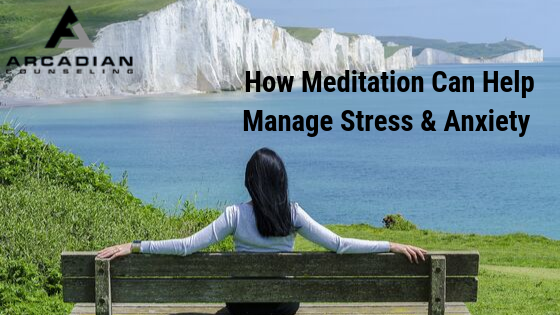Life is hard sometimes.
Whether it’s managing finances, battling long commutes, or consoling demanding children and bosses, stress manifests in a variety of ways.
Recent surveys reveal some pretty alarming statistics about stress:
33% of people feel they live with an extreme amount of stress, and 48% of individuals believe the stress in their lives has increased over the past five years.
What’s more, is an astounding 77% of people surveyed indicate they experience physical symptoms caused by stress.
What are some of these physical symptoms linked to stress?
- Chronic Pain
- Sleep problems
- Autoimmune diseases
- Digestive problems
- Skin conditions such as eczema
- Heart disease
- Weight problems
- Reproductive issues
- Thinking and memory issues
Meditation Can Help & Here’s How:
Scientific evidence now reveals that meditation is effective against physical symptoms of stretches such as IBS, high blood pressure, and ulcerative colitis. Meditation has also been linked with improved immune response, reduction in pain sensitivity, and a shift from a negative to positive mindset.
Furthermore, research has shown that meditation may physically alter the brain and improve how we cope with chronic stress.
But what exactly is meditation? When many people hear that word, they have a vision of someone sitting in lotus position chanting “Ohmmm” with a mind void of any thought.
Let’s be clear: this is not what I’m talking about. Mindful meditation is simply the practice of harnessing our attention to the present moment. Instead of letting our brains run rampant like energetic puppies, sniffing one thought after another after another after another, mindfulness focuses our attention in the now.
But meditation is called a “practice” for a reason. Like anything else that is beneficial to your mind and body (i.e., nutrition and exercise), it requires commitment to reap those benefits.
Tips for Beginner Meditators
- Find a quiet space and get comfortable – you don’t have to sit in a lotus position. Actually, you don’t have to sit at all if you don’t want to. Simply find a comfortable chair or couch and get as comfortable as possible.
- Breathe naturally. Meditation involves focusing on the breath and using it as an anchor for the mind, but try not to think about the breath or alter it in any way. Simply allow things to unfold naturally, noticing the rising and falling sensation it creates in the body.
- Be OK with discomfort. Beginners (and even experienced meditators) often experience negative emotions like frustration, restlessness, and irritation while practicing. Don’t try to resist these emotions, rather give them your full attention and allow them to come and go. Over time your mind will learn to recognize these emotions without getting caught up in negative patterns of thought. This skill is significantly beneficial not only during meditation but also in daily life.
- Don’t try to clear your mind. In fact, don’t try to do anything. Just breathe naturally and simply be aware of your breath. If you find your mind wandering to tasks, conflict, or anything else, do not get frustrated. Simply bring yourself back to the moment and focus on your breathing. Just the act of catching your mind wandering is mindfulness and being present in the moment. This is progress. Stick with it.
- Start with just a few minutes and build from there. I encourage my clients to start with 1 to 2 minutes per session and build from there. As you find that it’s easier and easier, add a minute or two as you go.
- Don’t try to be perfect. There is no perfection in life or meditation so just keep practicing every day. Remember this isn’t about achieving a state of enlightenment or achieving anything. It’s simply about bringing your attention to the here and now.
In my experience, when most people first start meditating, they experience some form or frustration which turns into self-judgment and evolves into a belief, “Meditation isn’t for me” or “I can’t meditate.” This is simply not true. Anyone can meditate and everyone can benefit from it. However, and I can’t stress this enough, the key to achieving the benefits is consistent practice.
If you find after you’ve been meditating for a little while that you could use some extra help dealing with the stress in your life, if may be worth considering reaching out to a professional for some additional guidance and support. A simple google search of “anxiety counselor near me” or simply, “counselor near me” will reveal some great options.
James Killian, LPC is an anxiety counselor in Woodbridge, CT and the Principal Therapist & Owner of Arcadian Counseling. If you need help with meditation or managing the stress in your life, we are happy to help. Contact us today for a free consultation!

